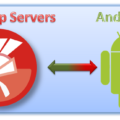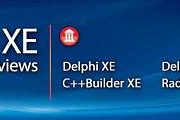Parameterized queries with dbExpress (DBX) Framework
In order to answer a question from two Brazilian developers about how to use parameterized queries using dbExpress Framework I decided to write this post.
Let start understanding the small difference between parameterized queries using DBX Framework and VCL. While VCL uses “:PARAMETER” to define query parameters, DBX Framework represent parameter as “?”, and it doesn’t include name.
We have been using VCL for a long time and are accustomed to read and write our code based on DataSet parameters. When you start using the DBX Framework you expect it to work in a very similar way, but the framework has some differences. The Delphi language allow us to extend the framework and it would became more VCL friendly.
In case you use only what you have in the DBX Framework, your code will look like this:
program DBX4Example;
{$APPTYPE CONSOLE}
uses
SysUtils,
DBXDynalink,
DBXCommon,
DBXInterbase;
var
aDBXConn: TDBXConnection;
aDBXTrans : TDBXTransaction;
aCmnd: TDBXCommand;
aReader: TDBXReader;
begin
aDBXConn := TDBXConnectionFactory.GetConnectionFactory.GetConnection('employee ib','sysdba','masterkey');
if aDBXConn <> nil then
begin
aCmnd := aDBXConn.CreateCommand;
// Start transaction
aDBXTrans:= aDBXConn.BeginTransaction(TDBXIsolations.ReadCommitted);
// Prepare and execute the SQL Statement
aCmnd.Text := 'SELECT * FROM Country Where Country = ?';
aCmnd.Prepare;
aCmnd.Parameters.Parameter[0].Value.SetAnsiString('USA');
aReader := aCmnd.ExecuteQuery;
while aReader.Next do
begin
Writeln( aReader.Value['Country'].GetAnsiString );
end;
// Commit transaction
aDBXConn.CommitFreeAndNil(aDBXTrans);
Readln;
aReader.Free;
aCmnd.Free;
aDbxConn.Free;
end;
end.
Note that in the SQL we use question mark to define the parameter, prepare the query and follow the long line to define the parameter value at position zero.
We can make this code more VCL friendly using Class Helpers, one of the new features implemented in Delphi 2006. It will allow us to extend the class without inheriting from it.
So we’ll extend the class TDBXParameterList, which will allow us to name the parameters and set their values by name.
The follow code extend the class through class helpers, look this is not inherited. This extension define two new methods:
SetParametersName: this method will receive a list of names, which will be used to name the parameters, you must pass a number of names equal to the number of parameters;
ByName: method that allows us to access parameters by name, the DBX Framework has the method GetOrdinal, it allow us to access parameters by name, but byName will be more VCL friendly;
unit DBXParameterListHelper;
interface
uses
DBXCommon, SysUtils;
type
TDBXParameterListHelper = class helper for TDBXParameterList
public
procedure SetParamatersName(aNames: Array of String);
function ByName( Name : String ) : TDBXWritableValue;
end;
implementation
{ TDBXParameterListHelper }
function TDBXParameterListHelper.ByName(Name: String): TDBXWritableValue;
begin
Result := Self.Parameter[Self.GetOrdinal(Name)].Value;
end;
procedure TDBXParameterListHelper.SetParamatersName(aNames: array of String);
var
i: Integer;
begin
if Length(aNames) <> Self.Count then
raise Exception.Create('aNames should have the same number of parameters');
for i := 0 to Self.Count - 1 do
begin
Self[i].Name := aNames[i];
end;
end;
end.
Using the extension this part of the code:
// Prepare and execute the SQL Statement
aCmnd.Text := 'SELECT * FROM Country Where Country = ?';
aCmnd.Prepare;
aCmnd.Parameters.Parameter[0].Value.SetAnsiString('USA');
Will be replaced by this one.
// Prepare and execute the SQL Statement
aCmnd.Text := 'SELECT * FROM Country Where Country = ?';
aCmnd.Prepare;
aCmnd.Parameters.SetParamatersName(['COUNTRYNAME']);
aCmnd.Parameters.ByName('COUNTRYNAME').SetAnsiString('USA');
In case your query has multiple parameteres, like this:
// Prepare and execute the SQL Statement
aCmnd.Text := 'SELECT * FROM Country Where Country = ? and Currency = ?';
aCmnd.Prepare;
aCmnd.Parameters.SetParamatersName(['COUNTRYNAME', 'CURRENCY']);
aCmnd.Parameters.ByName('COUNTRYNAME').SetAnsiString('USA');
aCmnd.Parameters.ByName('CURRENCY').SetAnsiString('Dolar');
In closing, we’ve learned how to work with query parameters in DBX Framework and how to use class helper to extend our classes.
Source code download, available here.
COUNTRYNAME






I think the code following the line “Will be replaced by this one.” has an error
Cmnd.Parameters.ByName(‘NAME’).SetAnsiString(‘USA’);
is probably meant to be
Cmnd.Parameters.ByName(‘COUNTRYNAME’).SetAnsiString(‘USA’);
Best regards,
Ajasja
Hi Ajasja, it’s fixed.
thanks
It looks like EMBD created an issue and you showed how to solve it 🙂
The class helpers also may be useful in resolving of the classic issue, when the developers are using the literals instead of parameters. The issue is due to, probably at first, that parameters usage requires more coding. The following my article shows how to “catch both hares” – to code less and still use the parameters. Take it as ironical 🙂
http://www.da-soft.com/blogs/the-parameterized-sql-queries-for-the-lazy.html
Nice post, thanks alot.